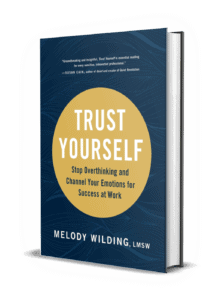Does the thought of giving negative feedback to an employee make you want to call in sick? If so, a fear of conflict may get in your way.
But you’re not doing anyone a favor by avoiding conflict. When problems go unaddressed or are swept under the rug, everyone suffers—including you. Avoiding conflict doesn’t just keep you from fulfilling your responsibilities. It also erodes your self-esteem. No one likes being the office push-over, and constantly questioning yourself can take a toll on your confidence levels (What if he explodes in rage? What if she says I’m a bad manager?).
A lack of constructive feedback is also detrimental to your team, depriving them of mentorship and growth opportunities. Workplaces marked by poor communication and unclear expectations are also breeding grounds for imposter syndrome, low trust, and disengagement.
Improving your ability to deliver feedback clearly and assertively does require practice. Learning to create a container for the strong emotions kicked up by difficult conversations can also take time. But the longer you wait, the higher the cost to both you and your team members.
Here’s how to get started with conquering your fear of conflict so you can manage more effectively.
Free GUIDE
7 Strategies to Speak Up With Confidence
Unsubscribe at any time. Your details are protected in accordance with my Privacy Policy.
How To Tackle Your Fear of Conflict
Challenge Your Assumptions
Many people who avoid confrontation jump to worse-case-scenarios and carry around stories like, “No one likes a micromanager,” or “Bringing up this issue will ruin our working relationship.” While these beliefs may stem from past experiences with rejection and failure, they reflect inaccurate, binary thinking. In actuality, it’s possible to be both assertive and direct without damaging relationships or earning a reputation as the “difficult manager.”
To challenge (and change) your assumptions, focus on what you could gain by speaking up. Compare this against a list of the costs you’re bearing as a result of skirting the issue. When you look more closely, you’ll see that expressing your thoughts, feelings, and opinions is far more beneficial than stuffing them down and suffering the consequences.
Reframe Feedback as a Tool That Empowers – Not Demoralizes – Others
Despite what you may believe, employees crave meaningful, candid feedback from their managers. Again, this forces you to reconsider your assumptions. Maybe you feel that feedback causes hurt feelings and bruised egos. On the contrary, it’s an underutilized way to inspire and motivate those around you.
While it’s true that some bosses thrive on tearing people down, most leaders genuinely care about helping those around them grow as individuals. Tactfully reflecting a person’s weaknesses affords them a special opportunity to develop skills like grit and a growth mindset.
When you reframe conflict as a healthy, normative part of leadership, it loosens the anticipatory anxiety, you may feel broaching difficult topics with others.
Communicate Thoughtfully and Directly
Before diving into corrective feedback, start by setting a non-adversarial tone for the conversation. Let the person know that you hope to have a two-way dialogue, not to lecture them. Welcome their input and ideas. Listen and validate their concerns.
You may also want to acknowledge that you’re possibly at fault, too. Saying something like, “We can talk about how I may have contributed to this problem,” can put people at ease. It signals to them that you’re not trying to pass blame—you’re sincerely trying to find solutions.
Using “I” statements whenever possible helps ensure you communicate directly without vacillating or minimizing your concerns simply because you’re scared. Being specific is also important. Rather than saying, “You dropped the ball again,” try saying, “I’m concerned that I didn’t get the documents in time for the client meeting today.”
Make Feedback Part of the Process
Do you only provide criticism when something goes horribly wrong, or, conversely, at formal performance reviews each quarter? If so, you may want to shift to a more routine schedule. Delaying difficult conversations only lets problems to linger.
As management expert Joseph Grenny suggests, strive to make feedback “a regular ritual rather than an occasional blast.” Why? Gradually exposing yourself to fearful situations is the best way to overcome them. The more you practice giving feedback in lower-stakes, everyday scenarios as part of your role, the better at it you’ll become.
You can open up regular communication channels in many ways, including working in weekly one-on-ones, initiating daily stand-ups, or using team collaboration tools.
Creating a positive feedback culture will give you more opportunities to flex your newfound assertiveness skills. It will also help you strengthen rapport and trust with your team. And that, as a manager, is one of the best things you can hope for.
Free GUIDE
7 Strategies to Speak Up With Confidence
Unsubscribe at any time. Your details are protected in accordance with my Privacy Policy.









